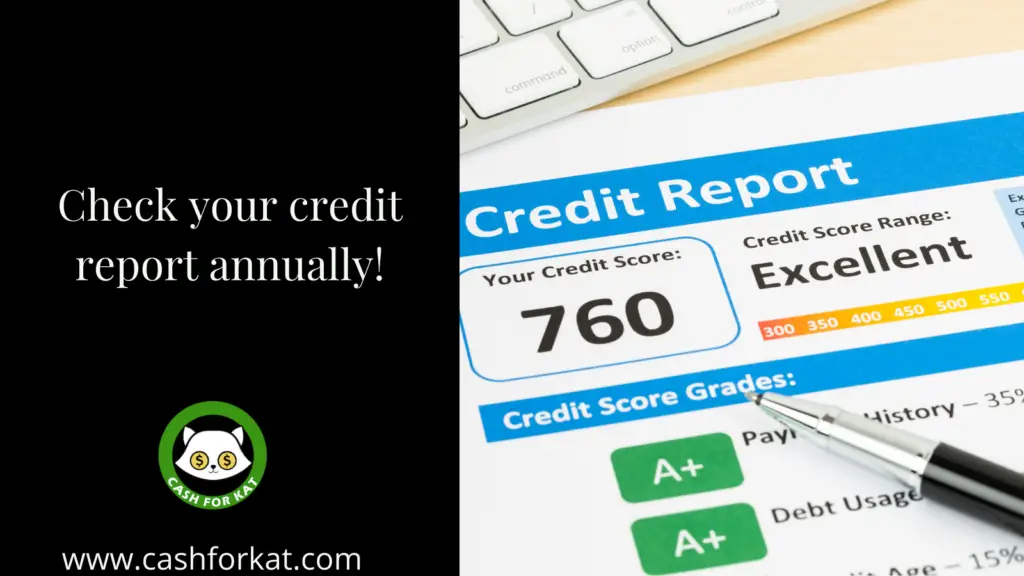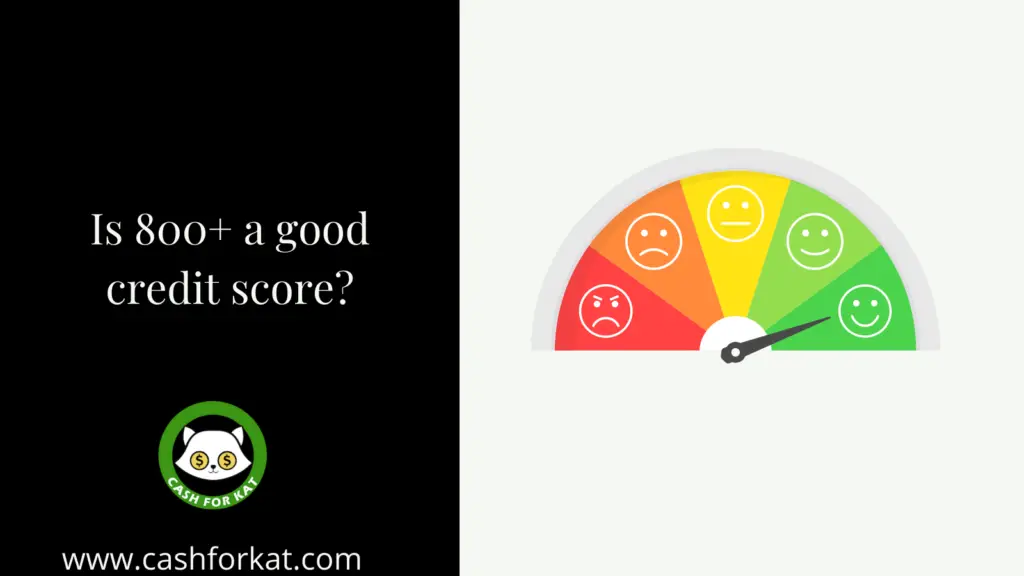
There are many ways to get an 800+ credit score, but some methods are more effective than others. I obtained an 800+ credit score just a month ago, at the age of 26!
In this article, I will share some of the most efficient ways to improve your credit score. I will also share exactly how I was able to obtain an 800+ credit score so young!
Table of Contents
- How to get an 800+ credit score
- Understanding Credit Scores
- Track your score
- Pay your bills on time
- Reduce bad debts
- Diversify credit lines
- Find a community
- Wait
- How I got my first 800+ credit score
- Is 800+ a good credit score?
- How long does it take to get an 800+ credit score?
- Final thoughts on how to get an 800+ credit score
How to get an 800+ credit score
The journey to an 800+ credit score is a marathon, not a sprint. In fact, according to Wallet Hub’s data, less than 1 out of every 6 people has a credit score above 800!
That being said, there are a few straightforward things you can do to get there a bit faster. Here are the 5 key steps that I took to get an 800+ credit score. These steps should be followed in order if at all possible!
Steps to getting an 800+ credit score:
- Understand credit scores
- Track your score
- Pay your bills on time
- Reduce “bad” debts
- Diversify credit lines
- Find a community
- Wait
Understanding Credit Scores
The first step to getting an 800+ credit score is to understand how credit scores work in the first place. In general, credit is not as easy to understand as other personal finance topics (like saving or paying down debt).
Most people who have an 800+ credit score did not get there by accident. I know I sure didn’t! I’ve been working towards this goal ever since I got my first credit card during my freshman year of college.
When you look at the criteria that impact your credit score, you will see that some are easier to change than others. Being aware of this will help you make financial choices earlier on that will decrease how long it takes you to gain that coveted 800+ credit score.
Here are the 5 criteria that impact your credit score:
1. Payment history – This is the most important factor, and it accounts for 35% of your credit score. Make sure you pay all of your bills on time, every time.
2. Amounts owed – This accounts for 30% of your credit score. Try to keep your credit utilization ratio below 30%. This means that you should not owe more than $30,000 on all of your credit cards combined.
3. Length of credit history – This accounts for 15% of your score. Make sure you have a variety of credit products and keep your oldest accounts open.
4. New credit – This accounts for 10% of your score. Try to avoid opening too many new accounts at once.
5. Types of credit – This accounts for 10% of your score. Make sure you have a mix of installment and revolving credit.
Credit Bureaus

Just as important as understanding your score is knowing where to obtain free copies of your credit report.
According to the Federal Trade Commission (FTC), the Fair Credit Reporting Act, a federal law, entitles you to one free copy of your report every 12 months. You can get a free copy from any of the 3 major credit bureaus: Equifax, Experian, and Transunion.
Now that you understand the criteria that impact your credit score, you can start taking steps to improve it. The next thing you will want to do is make sure you are tracking your credit regularly. This will help you see if the changes you are making are having a positive impact!
Track your score
Without a doubt, the only reason I was able to hit an 800+ credit score at 26 is that I’ve been tracking my score for years. Tracking is very important because you can see your progress while also protecting yourself from setbacks. Potential setbacks would include things like identity theft or loans that don’t drop off of your report when they should.
One of the most common tools for tracking your credit score, and the one I personally use, is Credit Karma. Credit Karma gives you monthly updates on changes to your score and even has some tips for you on how to improve yours faster.
In addition to regularly monitoring through an app like Credit Karma, you should also check your annual credit reports as mentioned above in the section on credit bureaus.
Pay your bills on time
Once you’ve learned about credit scores and started tracking them, you will notice that the biggest thing that changes your score is your spending habits. It is important to always pay your bills on time as missed payments hurt your score.
For credit cards, in particular, you will want to get to the point where you pay the balance due in full every month. This is one of the largest criteria that can impact your credit score! If you are currently carrying a balance and start paying it down, you will notice an immediate change in your credit score by the next billing cycle.
Keep your credit limit as high as possible and your credit utilization under 10%. The higher your credit limit, the less impact your monthly spending will have on your credit score.
Reduce bad debts
I recommend this as a top priority because reducing bad debts will have the fastest and largest impact on your credit score. Additionally, for many people, it is a good idea to get a handle on current debts before you consider opening new lines of credit.
A hot topic in the personal finance world is the difference between “good debts” and “bad” debts. The general idea is that some debts have a more positive impact on your financial situation in the long term than others. These “good debts” can be considered better to have than other kinds of debts.
Good debts would potentially be things like a mortgage or your student loans. As long as these debts carry a lower interest rate (under about 5%) and are not frivolous, then they might be considered “good”.
Bad debts would include things like credit card debts (aka consumer debts)or car loans that have a higher interest rate. For this category, most bad debts would have a high-interest rate (5% or above) and were used for non-essential needs.
Ultimately, reducing any debt will help to increase your credit score. That being said, it is usually best to focus on “bad” debts first as it can help you pay off your debts faster by saving money on interest.
Diversify credit lines
Now that we’ve discussed the importance of tackling debt, we can discuss ways to diversify your credit lines. Chances are, this step might occur somewhat naturally for you as you go through life. Student loans, car loans, mortgages, credit cards, etc. are all typical ways that people diversify their credit.
I would not recommend opening new credit lines if you are at risk of overspending or carrying a balance on them. This will just increase your debt and can have more of a negative impact on your score than a positive one!
If you do have a good handle on your debts, then I recommend checking out credit card churning. This is the act of signing up for credit cards to obtain the bonuses associated with them. You then keep the card open, likely paying in full one or two of your recurring monthly expenses.
This allows your credit line to mature without getting the card closed by your bank. Sometimes banks will close a credit card without asking if it looks like it isn’t being used, which can seriously impact your length of credit history!
Find a community
Personal finance is a topic that is often under-discussed. Many people see topics around money to be a bit taboo. Credit, in particular, is a topic that many people shy away from.
That is why it is so important to find a community of like-minded individuals who you can learn from and be inspired by!
There are so many different ways to find a community of people interested in credit. You can search for local meetups, online communities, or even social media groups.
In fact, I wouldn’t even have thought to work on my credit score at such a young age if I hadn’t already been following Reddit communities on personal finance.
Wait
As boring as it sounds, the last step to obtaining an 800+ credit score is to wait. If you are doing all of the steps above correctly then the only thing you have left to do is wait.
You will likely be waiting for two reasons. The first is that you might be paying down rotating debt (i.e. credit cards). You will have to pay down most of that before your score hits 800+. The other reason might be that you have to wait for your debt to “mature” enough.
I will say, out of all the personal finance challenges I’ve set for myself, improving my credit score was the most boring and took the longest. Your credit score is somewhat a reflection of your financial health. That is why it can take a long time to see the results of your good habits.
How I got my first 800+ credit score
Whenever I read articles, I always find myself wanting to know the nitty-gritty details of how people got an excellent credit score. That is why I am going to share exactly what my credit accounts looked like when I moved from a good credit score to an exceptional credit score.
For me, the biggest factor that pushed me into the 800+ credit score range was paying off my credit card balances. I had a bit of credit card debt from when I quit my job to travel the world and had to significantly reduce my credit card balance to obtain my highest credit score.
My credit card use
The month I obtained an 800+ credit score was the month that I paid off all 3 of my credit card bills in full. In fact, I actually obtained an 805 credit score!
This makes me believe I could have carried a bit of a balance and still have crossed the 800+ threshold. I attribute this to having a good credit mix and a large amount of available credit. Combined, my cards have a total credit limit of almost $25,000. So for me, even using 10% of my credit would be about $2,500!
Even though I paid my credit card bill in full in February of 2022, it still took a few weeks for it to be reflected in my credit score.
My payment history
I have always had a positive payment history. The only debts I’ve carried have been my credit cards and student loans.
I’ve always made on-time payments for my credit card bills and on my student loans.
My (lack of) derogatory marks
Derogatory marks can stay on your credit report for 7-10 years and can have a really high impact on your score.
Derogatory marks include any of your accounts that have been sent to collections for lack of payment or if you have public records (bankruptcies, tax liens, etc.)
I’ve never had any sort of derogatory mark on my credit report. If I did, it would be something that I would try to tackle immediately! These can take a long time to fix and should be a high priority if you have them.
My credit age
According to Credit Karma, my credit age is 6 years and 6 months. This has a medium impact on my score. However, there isn’t much I can do to change it except to pay off my “younger” student loans.
I actually have room to improve in this category! That means my score will likely go up a little bit every month as my credit matures.
My total accounts
I have 17 total accounts open. My student loan accounts represent 14 of the 17 and the rest are my credit cards.
Credit cards are considered revolving lines of credit because the amount you use each month can change. That is why it is so important to keep the credit utilization low on your cards!
It is good to have a variety of credit accounts, but I would not go out of my way to add more just to improve my credit score.
My (lack of) hard inquiries
Typically, having a lot of hard inquiries can be a sign you are a risky borrower. That is why it is important to not apply for too many credit cards or mortgages at the same time.
I’ve had hard inquiries in the past, but they do not count against you after a few years. When I obtained an 800+ credit score, I had no inquiries listed on my report. The last ones I had were credit inquiries from over 3 years ago and were no longer impacting my fico scores.
Is 800+ a good credit score?

Now that you know basically everything I know about credit scores, you might be wondering if 800 is even a good score!
For most lenders, any score above 800 is considered to be a high credit score. In fact, according to FICO, the average FICO score was only 716 in 2021! An 800+ score will help you obtain very good interest rates on car loans, personal loans, mortgages, and credit cards.
That being said, an 800 credit score is NOT a perfect score! A perfect credit score would be 850 and it is notoriously hard to obtain. It is a great score to strive for regardless, but it will take a long time to get there.
How long does it take to get an 800+ credit score?
For most people, it will likely take at least 6 years to get an 800+ credit score if you are starting without any credit. This is because you will need many different lines of credit open and it will take a while for them to mature on your credit report.
It took me almost 10 years to obtain an 800+ credit score. This time is from when I first opened a credit card in 2012 until the moment I obtained my 800+ score in 2022.
That being said, if I had paid down my credit card balance earlier I think I could have had an 800 credit score in about 8 years. If you already have some credit history, it is likely that you can obtain a high credit score faster by improving your credit utilization!
Final thoughts on how to get an 800+ credit score
I hope you have found this article helpful! If you are looking to improve your credit score, then the steps above will give you a good starting point.
Remember that it is important to tackle your debts and diversify your credit lines. Additionally, patience is key as it can take time for your good habits to show in your credit score.
Are you on the journey to obtaining an 800+ credit score? For those of you who have hit this milestone, how long did it take you to get there?